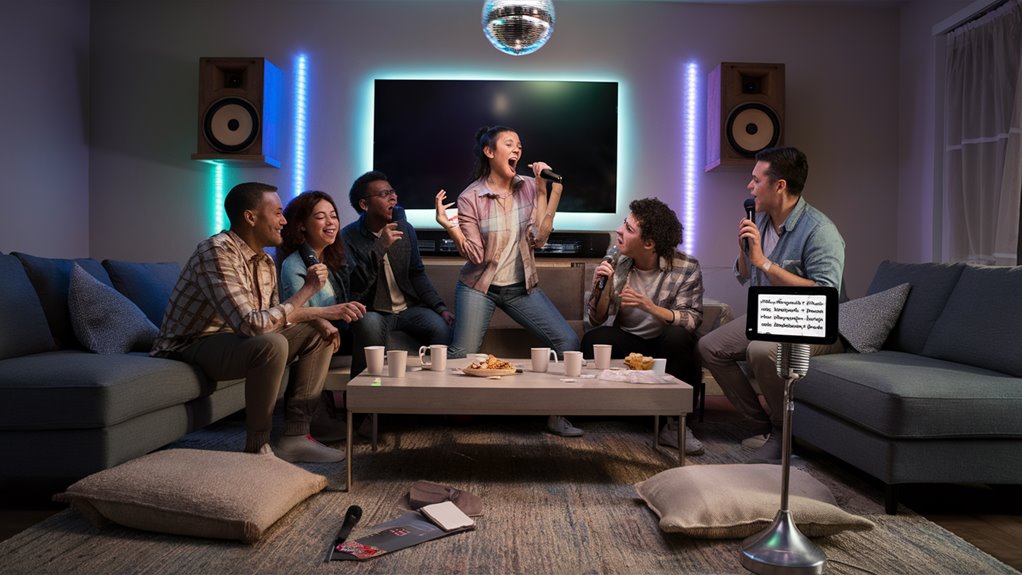
How to Host an Epic Karaoke Party at Home
Essential Equipment Setup
Your first step in preparing for a successful karaoke party is to make sure that you have the right equipment.
The Right Stuff
The three distinct elements needed to construct a professional karaoke setup.
Only powered speakers or a home theatre system with no less than 100 watts should be employed to provide crystal clear sound quality.
Add a compact mixer to handle more than one audio input at once.
Professional Pickup Equipment
The industry-standard for high-quality sound in a karaoke outfit is dynamic microphones with XLR connections.
You need at least two microphones-one main and one spare-for non-stop entertainment.
Supplemental Requirements
A microphone stand
Back-up cables
Wireless systems with spare batteries
Pop filters to help get rid of plosives such as “horse” that make certain sounds pop and hiss momentarily on their way out of the mouth.
Source Of Music
There are many ways to offer karaoke music:
Dedicated karaoke machines
Smart TV apps
Laptop systems
Digital streaming platforms like YouTube’s karaoke channels and subscription services (Karafun) offer extensive song libraries. If you are setting up your laptop to do karaoke, include an HDMI cable to move lyrics onto larger screens.
Optimization
Testing the entire sound system before use:
Adjust audio levels
Eliminate feedback loops
Check that lyrics will be visible to audience members from all parts of the room
Position speakers for optimum sound distribution
Test mic quality and wireless performance
Ensure all parts are working well together for a smooth and professional karaoke experience.
The Perfect Song List
Playlist Development
The secret to having a great karaoke night is making sure that everyone will get a turn. You need to strike a balance between songs with widely ranging vocal ranges and everyone’s personal tastes.
To facilitate karaoke performances for different skill levels, it is necessary to select your songs with thought.
Grade the songs on a scale from easiest to most difficult.
In the beginner stages, you should use songs that everyone is familiar with.
This caters to average singers who’ve had some practice but may not have polished their style
Have some skilled artists come forward to sizzle the highest-grade stuff for demonstration. Use a duet or ensemble form of performance to fire up the passion all around.
Playlist Preparation
A comprehensive playlist should include 50 to 60 carefully curated tracks spanning multiple decades and genres.
Difficulty Management
Popular classics from the 80s and 90s like “Sweet Caroline” and “I Will Survive” form an essential downstream line-up, complemented by current chart-toppers. Strategic song arrangement requires attention to varying skill levels.
Begin with beginner-friendly tracks like “Hey Jude” or “Sweet Home Alabama,” which feature simple melody lines and known lyrics. Advanced selections How to Choose the Right Song for Your Voice Type like “Bohemian Rhapsody” should be reserved for skilled performers. Use duets and ensembles to enhance the ambiance and create a number of memorable highlights among your audience members.
Structure and Organization of Playlist Chart Plays
Implement the proven 70-30 ratio for optimal playlist balance: Songs you can dance and sing along to together account to 70%. The other 30% must be a range of choices for diverse musical tastes.
Structure your song categories into distinct sections:
Folder for each type of music
Level of difficulty marking
Swings in tempo
The slow songs should be situated sporadically between your faster pieces, to maintain good event throughout.
Create a clear system of organization allowing guests to find easily the songs they desire and at their least potential difficulty.
Setting the Party Atmosphere
Professional Lighting and Sound Setup
Ambient lighting plays a key role in creating the ideal party environment. Run dimmable LED strips or smart bulbs across the ceiling and around walls will allow you to turn down ambient light levels with ease during your event. Install brighter illumination was then needed for setting out food; once everybody’s dining activities become quieter, create an interpersonal atmosphere by dimming all lights somewhat at that time.
Strategic sound equipment placement ensures optimal acoustics for your karaoke party. Position professional-grade speakers at ear level, angle them 45 degrees toward the center of audience: this arrangement both minimizes sound reflections and maximizes clarity. Achieving an immersive audio experience in which everyone is engrossed but without reverberation-effects is achieved only when such arrangements are utilized.

Stage and Audio-visual Equipment Layout and Selection of Optimal Settings
Arrange your guest seating in a U-shaped configuration around the marked performance area, leaving enough clearance for the performers to move and permitting audience interaction.
Mount your karaoke display screen as close to eye level as possible, making sure that good lines of sight are provided from all angles. Introduce professional cable management to remove tripping hazards and make for a clean, well-organized space.
Must-have Audio Added Feature
Create a digital song queue system or use a traditional signup board for streamlined performance management procedures.
Set up a designated photo area that features professional lighting and themed props for guests to take home lasting memories.
Add in other percussion instruments to add audience participation touches and continue to lift energy levels.
Conduct extensive sound checks Visit Website and fine-tune your audio system before the guests arrive, so that not a single technical glitch will disrupt your party activities.
Match Food with Alcohol
Ultimate Guide to Food and Drink Pairings for Karaoke Success
Strategic Food Selection for the Ultimate Oral Performance
Karaoke foods must be carefully selected to ensure good vocal quality throughout the night.
Stay away from dairy products, thick sauces, and heavy spices. They can spoil the singing.
Rather consider light finger foods such as:
Fresh vegetable trays
Bruschetta
Mini sandwiches
Voice-gentle starters
Hydration Essentials
Set up a water station which includes:
Room temperature water
Honey-lemon tea for the throat
Herbal teas of all kinds
Strategic Alcohol Service
During the songfest, weigh entertainment against looking after your voice on:
Signature mocktails
Limited alcoholic drinks service
Designated driver services
Performance-enhancing drink selection
Party Environment Arrangement
Managing Snacks
- Food Station Placement
Place refreshment stations at attended spots, keeping the food away from performance equipment, less noise interference and a better organized traffic flow. - Drink Stations
Keep drink stations around the pool, lake, or designated areas taken. - Guest Essentials
For a rapid and smooth operation you will need: disposable serving ware, abundant napkins, strategically placed waste bins, snacks for the larynx (popcorn, potato chips, etc.) and many serving stations.
By doing this you are creating the best conditions for starting singing while keeping your guests happy.
Song Selection Strategy
Once guests hit the floor, an unfamiliar song might be hard to follow. So every party with a complete karaoke setup needs structured song selection. Set up either adult old-fashioned or digitized modern-era systems where guest entrants write down what they will sing in advance.
Start with one song per person until everyone has had their turn, balancing faster numbers and medium ballads to keep the atmosphere energetic.
Getting the People on Their Feet
Where you continue to place projects in music will help maintain crowd enthusiasm. Oldies like “Sweet Caroline” and “Don’t Stop Believin'” strategically placed serve as perfect boosters when people start losing interest.
Keep a collection of popular Western-style duets handy to involve shy guests by pairing them with more seasoned singers.
Interactive Entertainment Elements
In between-sing activities will ensure that your guests do not be idle when they have a natural break. Add some fast-music mini-games such as “Guess The Song” or “Finish The Lyrics” for good measure.
Expect microphone hogging to be positively discouraged through your sign-up system. Keep an eye on the collective energy level of the group and insert occasional strategic refreshing breaks when necessary.
Tips on Party Management
Change musical styles to cover different people’s preferences.
Check volume always for the best acoustic effect.
Create thematic blocks of tunes to build up excitement.
Define clear performance standards to keep people from tripping all over each other.
Prepare secondary lists in case the machine breaks down.

